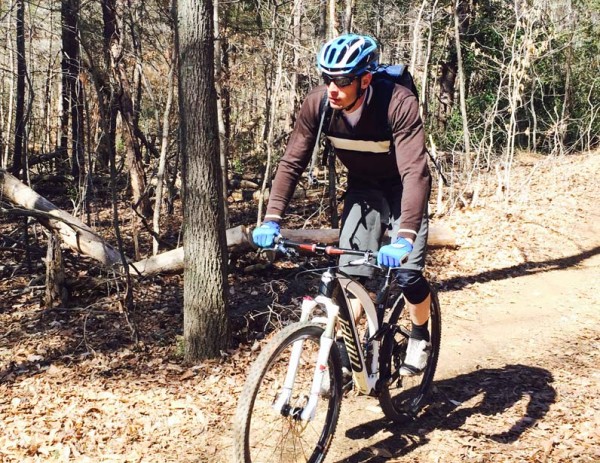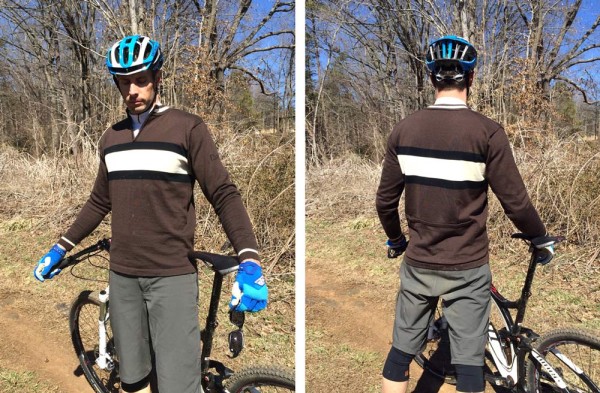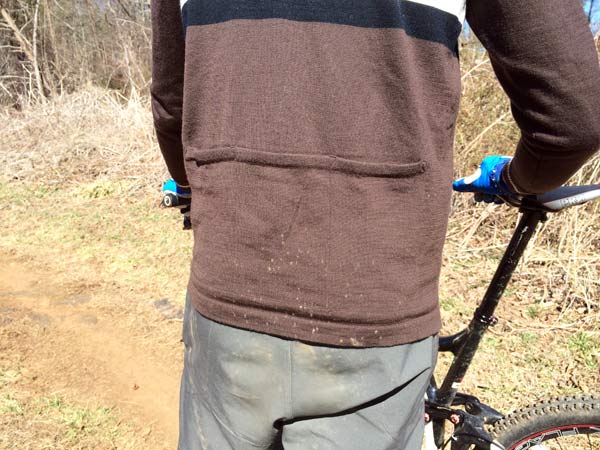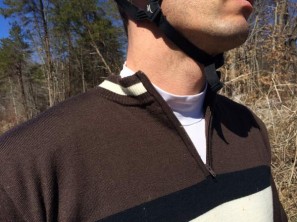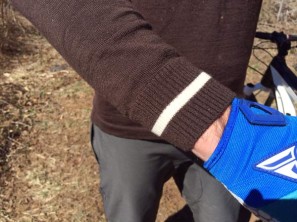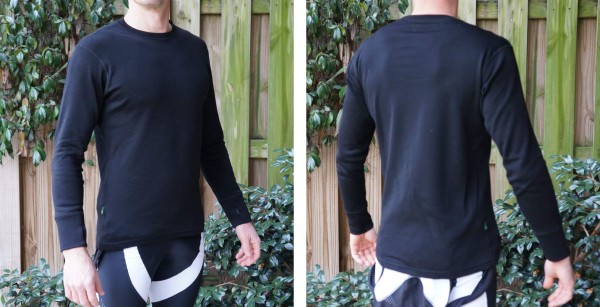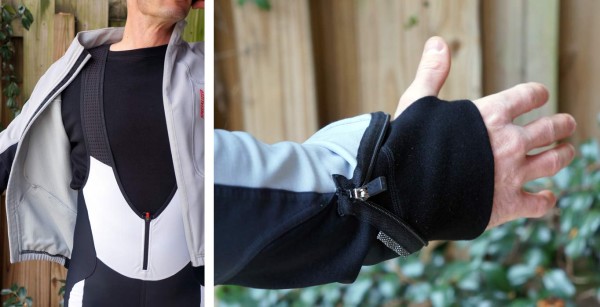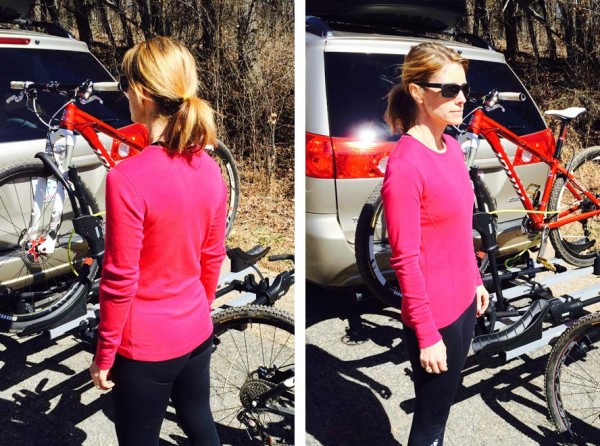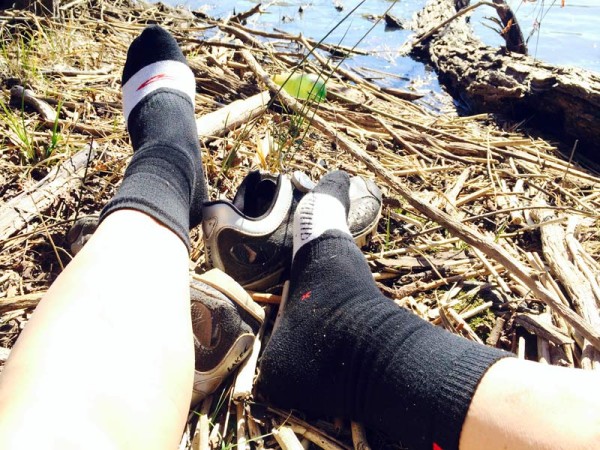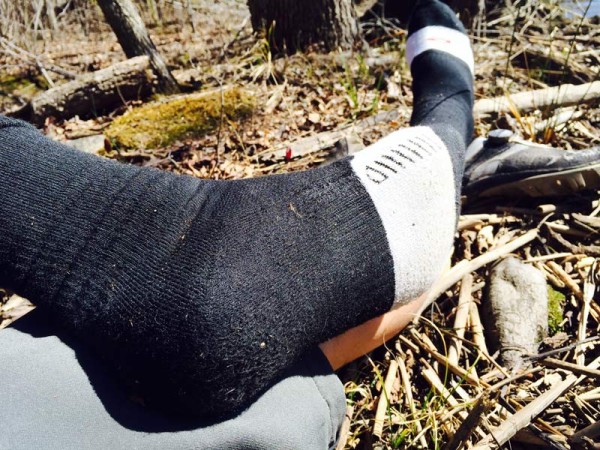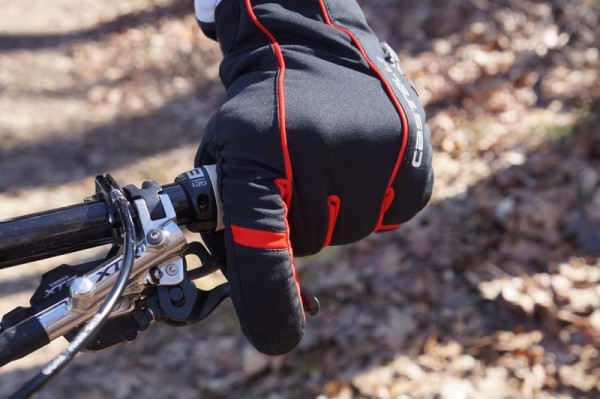With Winter slowly, begrudgingly turning into Spring, it’s time to bust out the cool weather pieces that help us transition from the 30º days to the 60º days. Some of the items here work better for the lower part of the thermometer, some for the upper parts, but all have proven themselves on the trail and/or road.
Above, the Earth, Wind & Rider long sleeve wool cycling jersey is as comfortable as they come. At 6’2″, I’m testing the XL on everything here unless noted (and Kristi tested a women’s version of one item). The EWR jersey’s sleeves and body are plenty long enough, and the cut is perfect for mountain biking or casual riding.
Roll on for pricing and details for this, plus goods from Castelli, Defeet and Wool-X…
The EWR jersey is also available in short sleeve, but the long sleeve one tested proved perfect in a range of temps up to the mid-60’s (F), and down in the mid-40’s with a base layer. Colder than that and I’d put a jacket over it. It seemed to wick moisture well and didn’t build up any funk, two great attributes of wool in general. EWR uses fine gauge Australian merino wool that’s super soft. The jerseys are available in red, green, blue, gray and brown.
The rear has three deep pockets. Anything too heavy will cause a bit of pull and sagging due to wool’s inherent stretch, so I just stowed stuff in a pack.
Other features include a short 1/4 zip (full zip is also an option) and stretch cuff. Otherwise, it’s pretty basic, but that’s OK. It does the job and does it well.
Retail is $160 to $180 depending on zipper style. About the only complaint would be the ordering system…you’ve gotta email them if you want one, or find them in a shop. It’s worth mentioning that I also have a couple of their full-zip sweaters, and they’re amazing, too. Good stuff all around.
WOOL-X
While we’re on wool, the Wool-X base layers are simply amazing. They’re not cycling specific, so the body isn’t as form fitting as a proper bike piece would be, but they’re not so baggy that they don’t fit under a standard cycling jacket or winter jersey. I tested the Xtreme Heavyweight piece, which kept me perfectly warm with just a fleece-lined windproof cycling jersey over top on a 30º day. Normally, in that temp, I’d be running a base layer plus jersey plus jacket, so it was nice having fewer layers without giving up comfort.
The sleeves have thumb loops. For shorter folks, they’d allow continuous use and partial hand coverage. At my height, they were a bit tight in the riding position, but made it super easy to pull another jersey over them without having to dig for the sleeves as they were pulled halfway up my arms.
Kristi tested the mid-weight women’s wool thermal base layer. She’s not one to enjoy the cold, but she also tends to overheat easily with too many layers. We rode on a sunny, upper-50’s day and the top kept her perfectly comfortable all on it’s own. She also tested a pair of their base layer bottoms (not shown) and said they’re warmer on their own then wearing jeans. Paired with shell pants, they’d make for a perfect winter layering system. As do the tops…the Heavyweight has become an overused part of my winter cycling wardrobe and I’m now pining for a midweight top and bottom of my own.
Wool-X also uses 100% Australian merino wool. And it’s also amazingly soft, comfortable and completely itch free. They even say you can machine dry it, but we’re not that brave. Both of us have been wearing these things almost non-stop through the cold, wet winter we’ve been having in North Carolina and loving them. Highly recommend them. Retail is $85 to $120.
DEFEET
While Defeet does make wool socks, it’s here we depart from nature’s best material. Their new Thermeator socks use a synthetic, hollow core yarn called Thermolite. They say it’s 30% lighter than wool, with all the insulative properties but dries faster and wicks well. Yet, somehow, it feels just as soft and cozy as the best wool socks I’ve tried.
They’re medium thick, so they tended to fit well under most cycling shoes. The sole has plenty of cushioning all the way from the heels to the toes, and there’s a mid-foot compression band. Like the others, these do well in a range of temps, from below freezing with true winter cycling boots to pleasant-but-cool sunny spring days in standard, well-vented shoes.
Retail’s $14.99 per pair and they come with gray, red or blue trim at top/back of the cuff. Otherwise, they’re all black and white.
CASTELLI x POLARTEC POWER DRY
Usually, the product brand is the one sending in items for review. In this case, Polartec wanted to feature their Power Dry lining, and these Castelli CW 3.1 winter gloves were the vehicle of choice.
Polartec Power Dry is a dual fiber fabric, using larger fibers against the skin for comfort and to draw moisture off the surface and micro fibers behind that to wick the moisture away for evaporation. The material can be used in a variety of applications, providing an assist to insulated winter gear or blocking UV rays on lighter items.
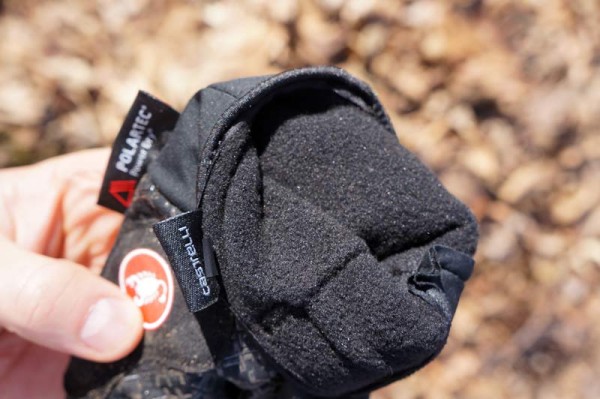
It’s incredibly soft, and combined very well with the wind/water resistant shell of the Castelli gloves. My hands tend to get colder quicker on mountain bike rides because of the increased pressure on the palms (my theory, anyway), and these kept everything toasty even in the mid-30’s. They also fit really well, with no undue bunching and no restriction of finger movement. The cuffs aren’t elastic but have a small Velcro retention strap on the underside. They’re just deep enough to cover the gap on the wrist thoroughly.
Given how soft the exterior was, I was surprised at how warm these gloves were. The thumb panel has decent snot wiping real estate, and the palms have grip texture and an abrasion pad that work well. Overall, they were impressive and worth a look if you need something to handle that 30-50 degree (F) spread.
